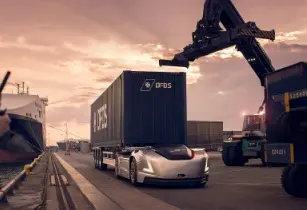Volvo Trucks has collaborated with ferry and logistics company DFDS for an autonomous transport solution from a logistics centre to a port terminal in Gothenburg, Sweden
Volvo Trucks will implement its electric, connected and autonomous vehicle Vera in a real application, enabling a connected system for a continuous flow of goods, from DFDS? logistics centre to an APM Terminals port facility in Gothenburg, for distribution across the world.
In 2018, Volvo Trucks presented its first electric, connected and autonomous solution, designed for repetitive assignments in logistics centres, factories and ports. According to the company, Vera is suited for short distances, transporting large volumes of goods with high precision.
The aim is to implement a connected system consisting of several Vera vehicles monitored by a control tower. The purpose is to enable a seamless and constant flow responsive to demands on greater efficiency, flexibility and sustainability. The collaboration with DFDS is a first step towards implementing Vera in a real transport assignment on pre-defined public roads in an industrial area.
This collaboration is expected to help us develop an efficient, flexible and sustainable long-term solution for receiving autonomous vehicles arriving at the gates, benefitting the customers and the environment, said Torben Carlsen, CEO of DFDS.
The autonomous transport solution is set to be further developed in terms of technology, operations management and infrastructure adaptations before it can be fully operational. Moreover, necessary safety precautions will be taken to meet societal requirements for a safe path towards autonomous transports.
?Autonomous transports with low noise levels and zero exhaust emissions have an important role to play in the future of logistics and will benefit both business and society. We see this collaboration as an important start and want to drive progress in this area,? added Karlsson.







